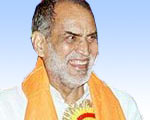
July 09: Sunday morning brought an irreparable loss for Indian politics especially the socialist camp in the form of demise of Chandra Shekhar Singh, eleventh prime minister of India and president of Samajwadi Janata Party. He was admitted to the Apollo hospital in May for the treatment of cancer.
He made his way to Lok Sabha almost eight times from the constituency Ballia, Eastern Uttar Pradesh. He was an outstanding parliamentarian who always stuck to the conventions of the house and remained true and honest to the values and traditions. He became a member of parliament in 1962 as a member of Rajya sabha. Afterwards in 1977 he was elected a member of Lok Sabha from Ballia. In 1964 he joined Congress party to combat the right wing politics emerging at that time and always worked for the restoration of the values of the party forgotten during emergency.
Chandra Shekhar carved a niche for himself as a socialist who was really concerned for the mass of the country. Though, he served as prime minister for a short period from November 1990 to June 1991 but during that brief span only he brought the country out of the tough times by dint of his wisdom and statesmanship.
He is known as a true socialist, secularist and nationalist who never got diverted from the principles and values he believed in. Vice-President Bhairon Singh Shekhawat expressed his sorrow over the death of the veteran parliamentarian saying that country’s poor lost their messiah.
Prime Minister Man Mohan Singh praised his statesmanship and the courage to take unpopular decisions in the interest of the country. Former Prime Minister Atal Bihari Vajpai mourned his death saying that an era of struggle has ended and personally he lost a friend.
Mr. Singh was popular among his collogues for being tolerant to the dissent and differing opinions. Many leaders quoted him as a visionary, reformer, a true patriot and staunch upholder of the finest values of Parliamentary Democracy.
Chandra Shekhar always opposed the personality cult in politics. He also exposed the state patronage of the monopoly capital and voiced against liberalization and globalization in favour of the Poor’s interests. Through out his life he remained a true follower of Gandhian principles.
|
|
Read More: Ballia


Comments: